Essay on Academic Integrity, Plagiarism, and Their Effects
VerifiedAdded on 2021/06/16
|5
|1198
|80
Essay
AI Summary
This essay delves into the crucial concepts of academic integrity and plagiarism, outlining their significance in higher education. It defines academic integrity as encompassing honesty and responsibility in academic work, including assignments, presentations, and exams. The essay then explores the three main types of plagiarism: direct, self, and accidental, highlighting the consequences of academic dishonesty, such as academic, social, and legal repercussions. Furthermore, the essay discusses the positive effects and benefits of upholding academic integrity, such as building trust and fostering a strong work ethic. The importance of academic integrity in fostering student's own ideas and opinions is also emphasized. The essay concludes by reiterating the role of universities in promoting knowledge through academic processes and the need for students to develop their own perspectives on academic work.
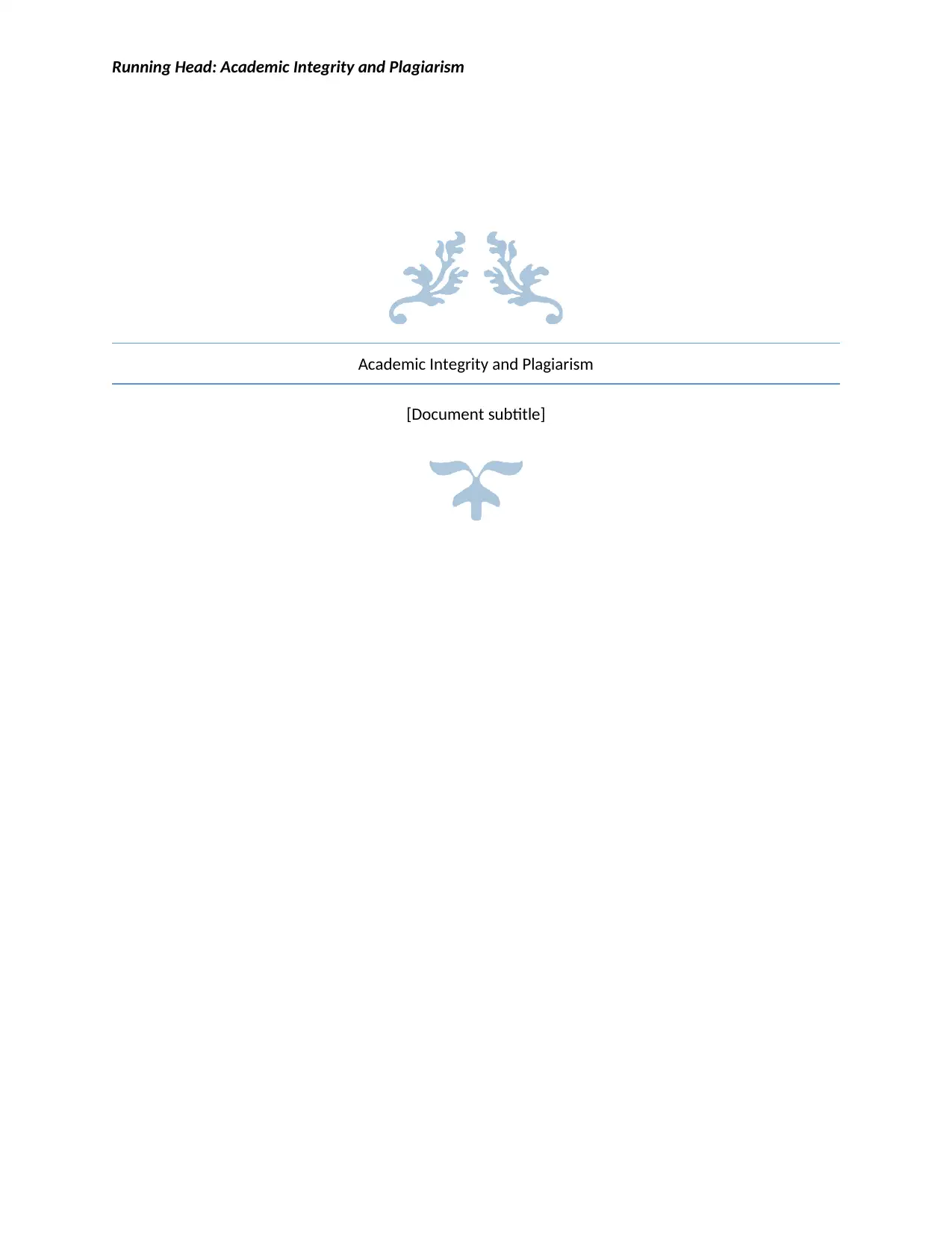
Running Head: Academic Integrity and Plagiarism
Academic Integrity and Plagiarism
[Document subtitle]
Academic Integrity and Plagiarism
[Document subtitle]
Paraphrase This Document
Need a fresh take? Get an instant paraphrase of this document with our AI Paraphraser
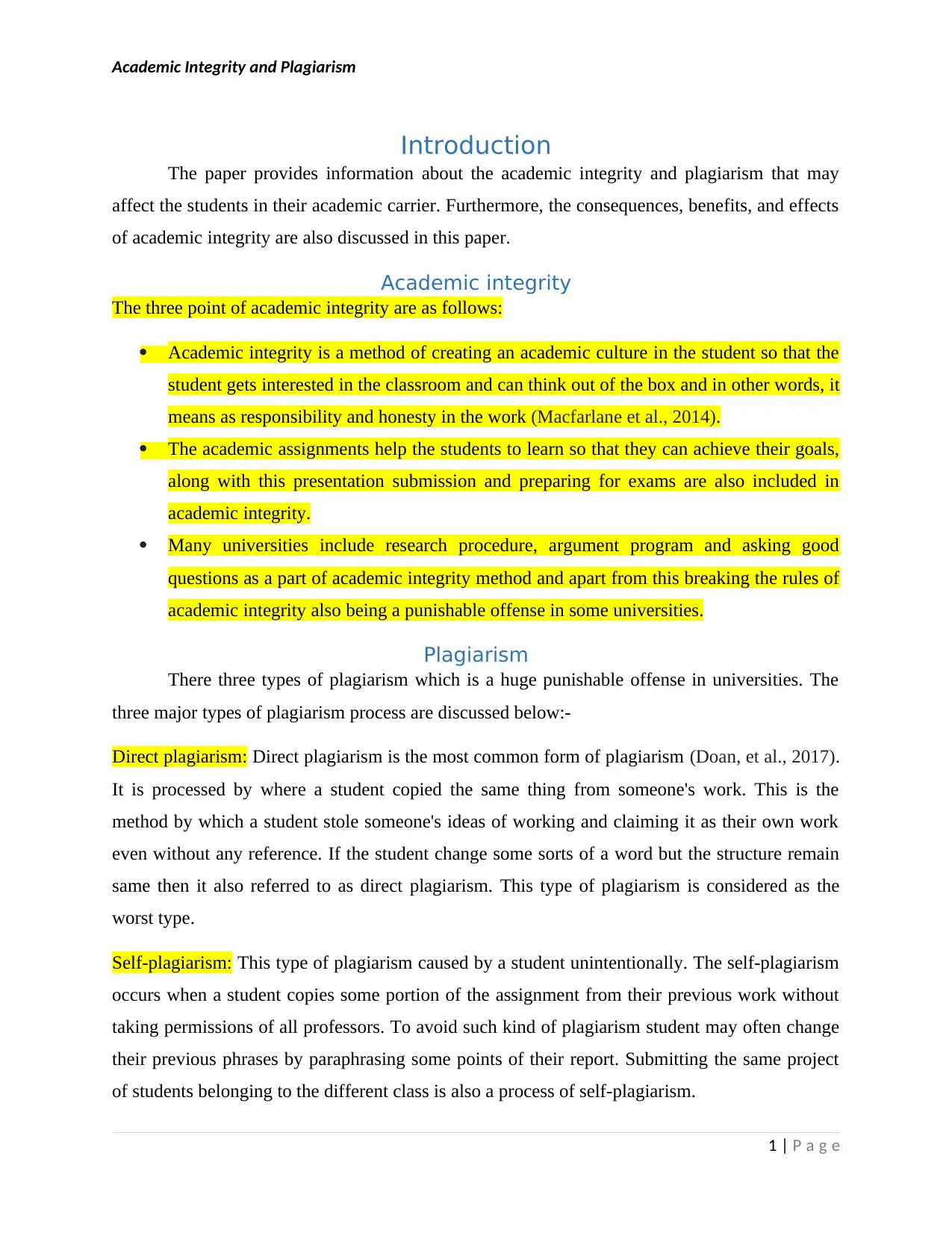
Academic Integrity and Plagiarism
Introduction
The paper provides information about the academic integrity and plagiarism that may
affect the students in their academic carrier. Furthermore, the consequences, benefits, and effects
of academic integrity are also discussed in this paper.
Academic integrity
The three point of academic integrity are as follows:
Academic integrity is a method of creating an academic culture in the student so that the
student gets interested in the classroom and can think out of the box and in other words, it
means as responsibility and honesty in the work (Macfarlane et al., 2014).
The academic assignments help the students to learn so that they can achieve their goals,
along with this presentation submission and preparing for exams are also included in
academic integrity.
Many universities include research procedure, argument program and asking good
questions as a part of academic integrity method and apart from this breaking the rules of
academic integrity also being a punishable offense in some universities.
Plagiarism
There three types of plagiarism which is a huge punishable offense in universities. The
three major types of plagiarism process are discussed below:-
Direct plagiarism: Direct plagiarism is the most common form of plagiarism (Doan, et al., 2017).
It is processed by where a student copied the same thing from someone's work. This is the
method by which a student stole someone's ideas of working and claiming it as their own work
even without any reference. If the student change some sorts of a word but the structure remain
same then it also referred to as direct plagiarism. This type of plagiarism is considered as the
worst type.
Self-plagiarism: This type of plagiarism caused by a student unintentionally. The self-plagiarism
occurs when a student copies some portion of the assignment from their previous work without
taking permissions of all professors. To avoid such kind of plagiarism student may often change
their previous phrases by paraphrasing some points of their report. Submitting the same project
of students belonging to the different class is also a process of self-plagiarism.
1 | P a g e
Introduction
The paper provides information about the academic integrity and plagiarism that may
affect the students in their academic carrier. Furthermore, the consequences, benefits, and effects
of academic integrity are also discussed in this paper.
Academic integrity
The three point of academic integrity are as follows:
Academic integrity is a method of creating an academic culture in the student so that the
student gets interested in the classroom and can think out of the box and in other words, it
means as responsibility and honesty in the work (Macfarlane et al., 2014).
The academic assignments help the students to learn so that they can achieve their goals,
along with this presentation submission and preparing for exams are also included in
academic integrity.
Many universities include research procedure, argument program and asking good
questions as a part of academic integrity method and apart from this breaking the rules of
academic integrity also being a punishable offense in some universities.
Plagiarism
There three types of plagiarism which is a huge punishable offense in universities. The
three major types of plagiarism process are discussed below:-
Direct plagiarism: Direct plagiarism is the most common form of plagiarism (Doan, et al., 2017).
It is processed by where a student copied the same thing from someone's work. This is the
method by which a student stole someone's ideas of working and claiming it as their own work
even without any reference. If the student change some sorts of a word but the structure remain
same then it also referred to as direct plagiarism. This type of plagiarism is considered as the
worst type.
Self-plagiarism: This type of plagiarism caused by a student unintentionally. The self-plagiarism
occurs when a student copies some portion of the assignment from their previous work without
taking permissions of all professors. To avoid such kind of plagiarism student may often change
their previous phrases by paraphrasing some points of their report. Submitting the same project
of students belonging to the different class is also a process of self-plagiarism.
1 | P a g e
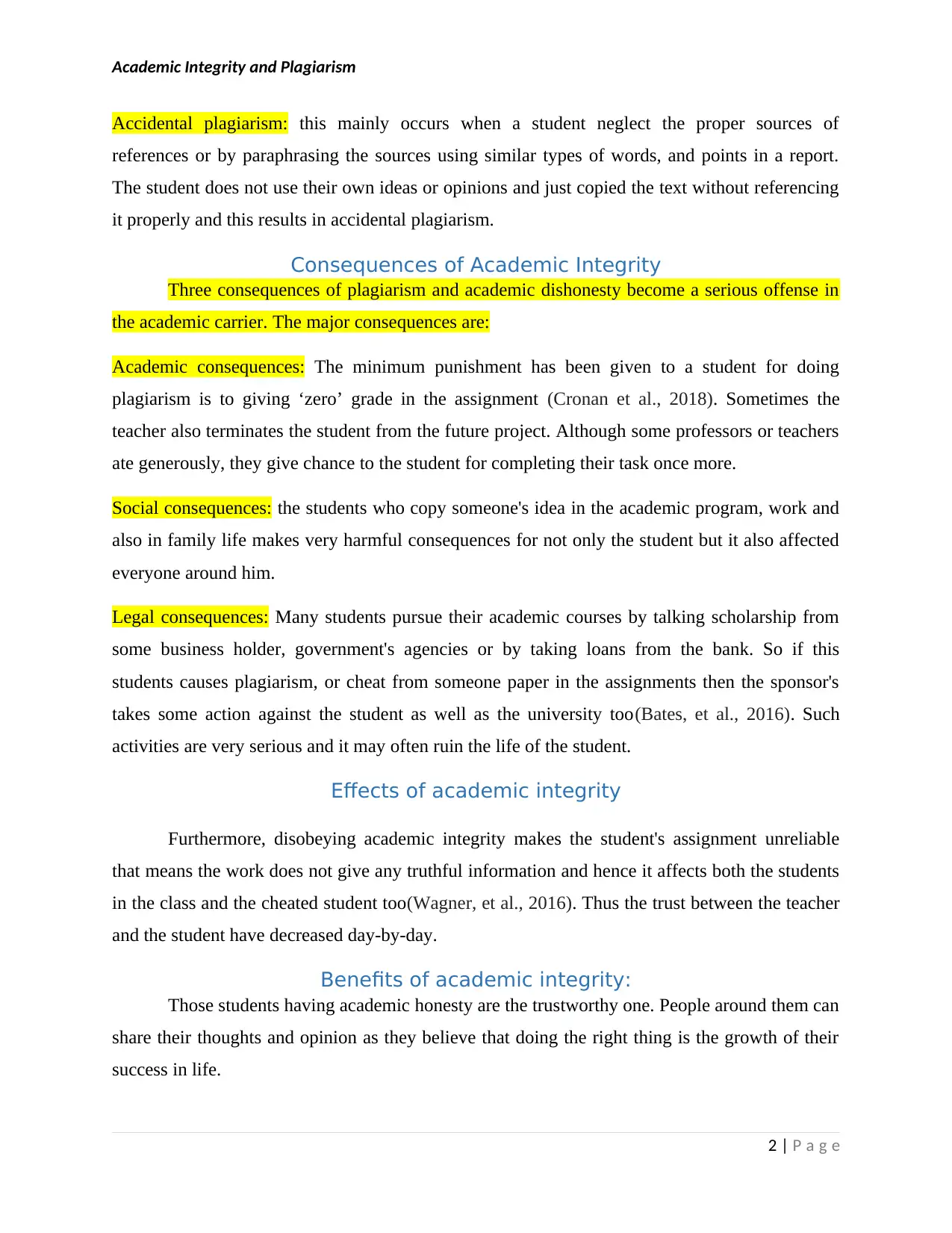
Academic Integrity and Plagiarism
Accidental plagiarism: this mainly occurs when a student neglect the proper sources of
references or by paraphrasing the sources using similar types of words, and points in a report.
The student does not use their own ideas or opinions and just copied the text without referencing
it properly and this results in accidental plagiarism.
Consequences of Academic Integrity
Three consequences of plagiarism and academic dishonesty become a serious offense in
the academic carrier. The major consequences are:
Academic consequences: The minimum punishment has been given to a student for doing
plagiarism is to giving ‘zero’ grade in the assignment (Cronan et al., 2018). Sometimes the
teacher also terminates the student from the future project. Although some professors or teachers
ate generously, they give chance to the student for completing their task once more.
Social consequences: the students who copy someone's idea in the academic program, work and
also in family life makes very harmful consequences for not only the student but it also affected
everyone around him.
Legal consequences: Many students pursue their academic courses by talking scholarship from
some business holder, government's agencies or by taking loans from the bank. So if this
students causes plagiarism, or cheat from someone paper in the assignments then the sponsor's
takes some action against the student as well as the university too(Bates, et al., 2016). Such
activities are very serious and it may often ruin the life of the student.
Effects of academic integrity
Furthermore, disobeying academic integrity makes the student's assignment unreliable
that means the work does not give any truthful information and hence it affects both the students
in the class and the cheated student too(Wagner, et al., 2016). Thus the trust between the teacher
and the student have decreased day-by-day.
Benefits of academic integrity:
Those students having academic honesty are the trustworthy one. People around them can
share their thoughts and opinion as they believe that doing the right thing is the growth of their
success in life.
2 | P a g e
Accidental plagiarism: this mainly occurs when a student neglect the proper sources of
references or by paraphrasing the sources using similar types of words, and points in a report.
The student does not use their own ideas or opinions and just copied the text without referencing
it properly and this results in accidental plagiarism.
Consequences of Academic Integrity
Three consequences of plagiarism and academic dishonesty become a serious offense in
the academic carrier. The major consequences are:
Academic consequences: The minimum punishment has been given to a student for doing
plagiarism is to giving ‘zero’ grade in the assignment (Cronan et al., 2018). Sometimes the
teacher also terminates the student from the future project. Although some professors or teachers
ate generously, they give chance to the student for completing their task once more.
Social consequences: the students who copy someone's idea in the academic program, work and
also in family life makes very harmful consequences for not only the student but it also affected
everyone around him.
Legal consequences: Many students pursue their academic courses by talking scholarship from
some business holder, government's agencies or by taking loans from the bank. So if this
students causes plagiarism, or cheat from someone paper in the assignments then the sponsor's
takes some action against the student as well as the university too(Bates, et al., 2016). Such
activities are very serious and it may often ruin the life of the student.
Effects of academic integrity
Furthermore, disobeying academic integrity makes the student's assignment unreliable
that means the work does not give any truthful information and hence it affects both the students
in the class and the cheated student too(Wagner, et al., 2016). Thus the trust between the teacher
and the student have decreased day-by-day.
Benefits of academic integrity:
Those students having academic honesty are the trustworthy one. People around them can
share their thoughts and opinion as they believe that doing the right thing is the growth of their
success in life.
2 | P a g e
⊘ This is a preview!⊘
Do you want full access?
Subscribe today to unlock all pages.

Trusted by 1+ million students worldwide
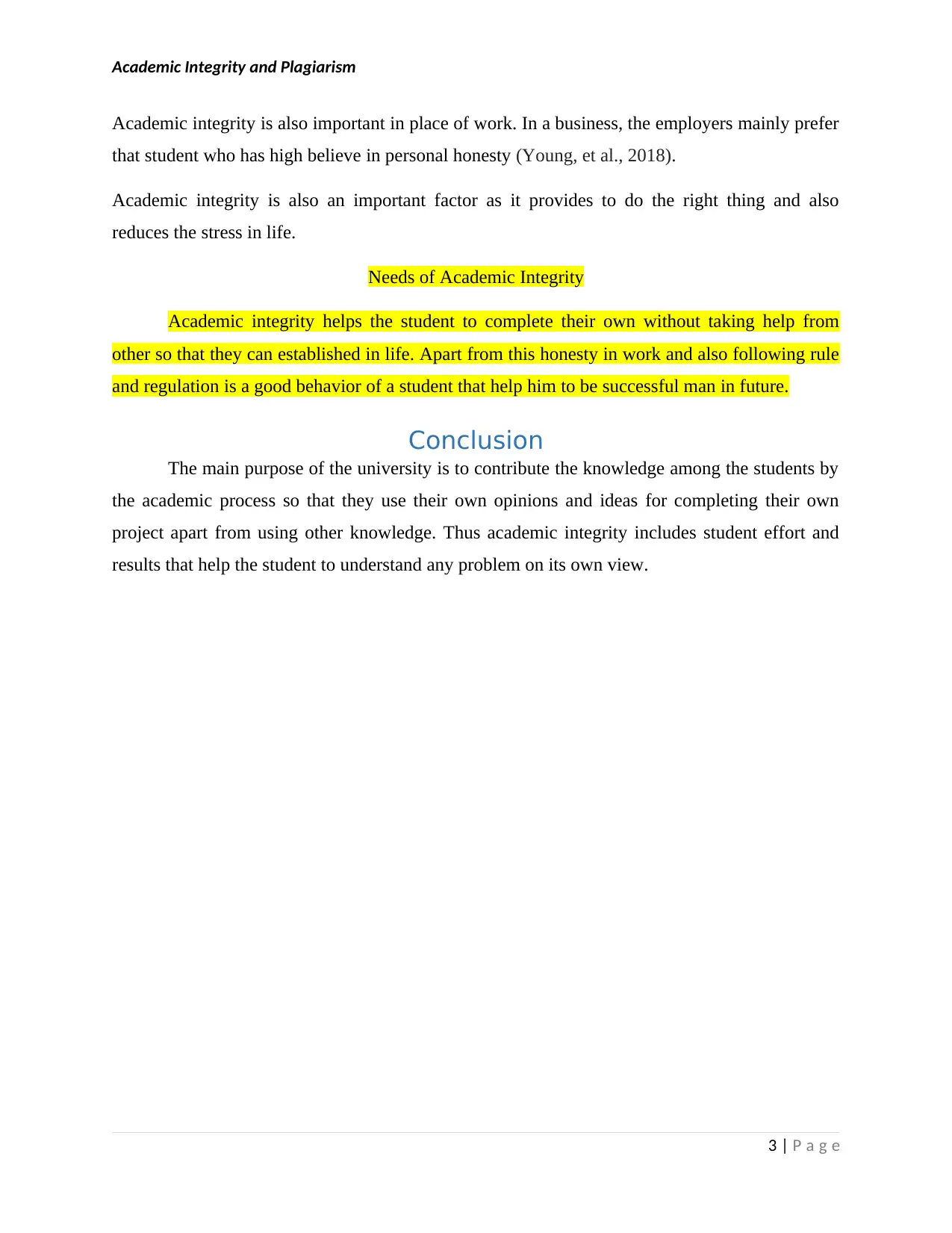
Academic Integrity and Plagiarism
Academic integrity is also important in place of work. In a business, the employers mainly prefer
that student who has high believe in personal honesty (Young, et al., 2018).
Academic integrity is also an important factor as it provides to do the right thing and also
reduces the stress in life.
Needs of Academic Integrity
Academic integrity helps the student to complete their own without taking help from
other so that they can established in life. Apart from this honesty in work and also following rule
and regulation is a good behavior of a student that help him to be successful man in future.
Conclusion
The main purpose of the university is to contribute the knowledge among the students by
the academic process so that they use their own opinions and ideas for completing their own
project apart from using other knowledge. Thus academic integrity includes student effort and
results that help the student to understand any problem on its own view.
3 | P a g e
Academic integrity is also important in place of work. In a business, the employers mainly prefer
that student who has high believe in personal honesty (Young, et al., 2018).
Academic integrity is also an important factor as it provides to do the right thing and also
reduces the stress in life.
Needs of Academic Integrity
Academic integrity helps the student to complete their own without taking help from
other so that they can established in life. Apart from this honesty in work and also following rule
and regulation is a good behavior of a student that help him to be successful man in future.
Conclusion
The main purpose of the university is to contribute the knowledge among the students by
the academic process so that they use their own opinions and ideas for completing their own
project apart from using other knowledge. Thus academic integrity includes student effort and
results that help the student to understand any problem on its own view.
3 | P a g e
Paraphrase This Document
Need a fresh take? Get an instant paraphrase of this document with our AI Paraphraser
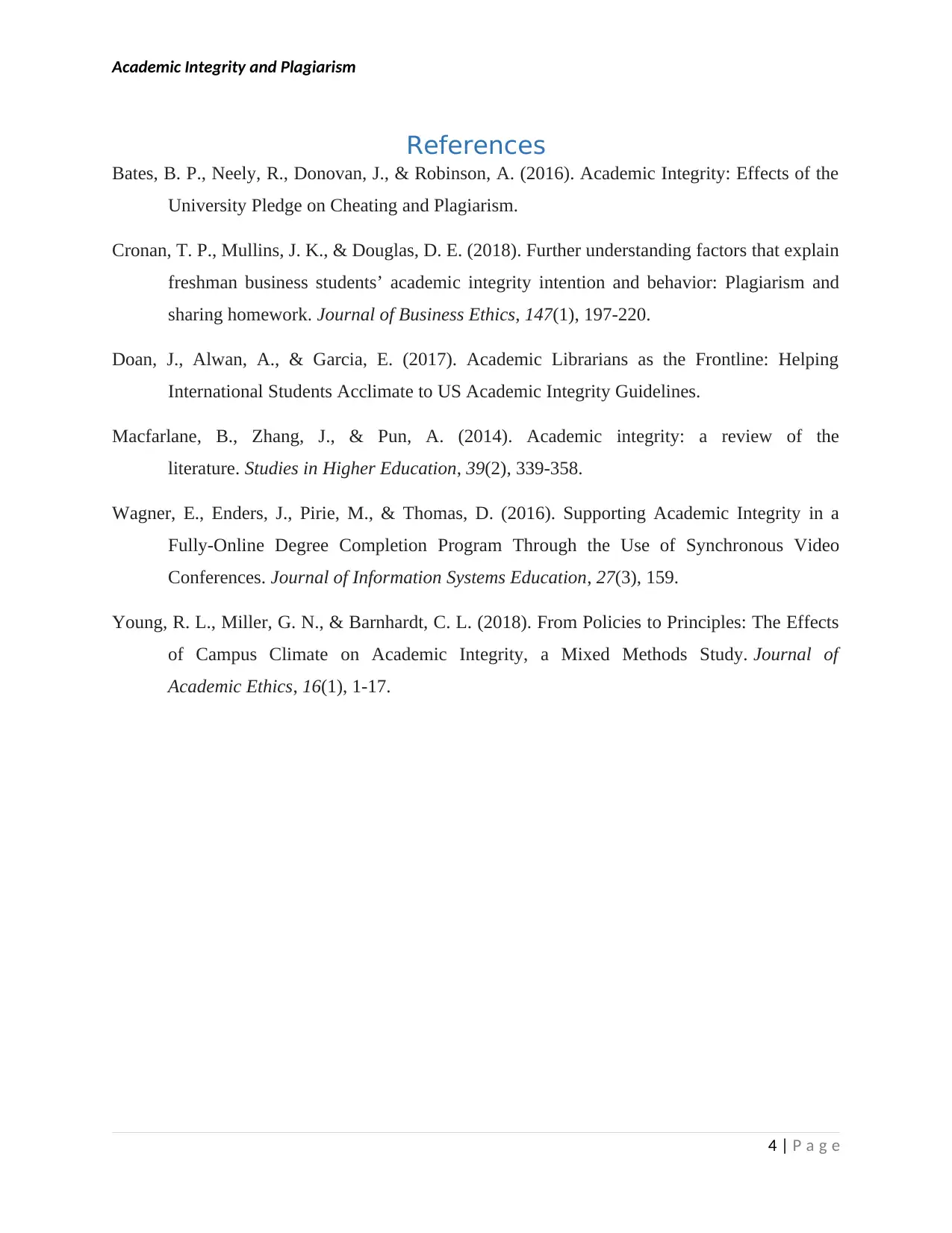
Academic Integrity and Plagiarism
References
Bates, B. P., Neely, R., Donovan, J., & Robinson, A. (2016). Academic Integrity: Effects of the
University Pledge on Cheating and Plagiarism.
Cronan, T. P., Mullins, J. K., & Douglas, D. E. (2018). Further understanding factors that explain
freshman business students’ academic integrity intention and behavior: Plagiarism and
sharing homework. Journal of Business Ethics, 147(1), 197-220.
Doan, J., Alwan, A., & Garcia, E. (2017). Academic Librarians as the Frontline: Helping
International Students Acclimate to US Academic Integrity Guidelines.
Macfarlane, B., Zhang, J., & Pun, A. (2014). Academic integrity: a review of the
literature. Studies in Higher Education, 39(2), 339-358.
Wagner, E., Enders, J., Pirie, M., & Thomas, D. (2016). Supporting Academic Integrity in a
Fully-Online Degree Completion Program Through the Use of Synchronous Video
Conferences. Journal of Information Systems Education, 27(3), 159.
Young, R. L., Miller, G. N., & Barnhardt, C. L. (2018). From Policies to Principles: The Effects
of Campus Climate on Academic Integrity, a Mixed Methods Study. Journal of
Academic Ethics, 16(1), 1-17.
4 | P a g e
References
Bates, B. P., Neely, R., Donovan, J., & Robinson, A. (2016). Academic Integrity: Effects of the
University Pledge on Cheating and Plagiarism.
Cronan, T. P., Mullins, J. K., & Douglas, D. E. (2018). Further understanding factors that explain
freshman business students’ academic integrity intention and behavior: Plagiarism and
sharing homework. Journal of Business Ethics, 147(1), 197-220.
Doan, J., Alwan, A., & Garcia, E. (2017). Academic Librarians as the Frontline: Helping
International Students Acclimate to US Academic Integrity Guidelines.
Macfarlane, B., Zhang, J., & Pun, A. (2014). Academic integrity: a review of the
literature. Studies in Higher Education, 39(2), 339-358.
Wagner, E., Enders, J., Pirie, M., & Thomas, D. (2016). Supporting Academic Integrity in a
Fully-Online Degree Completion Program Through the Use of Synchronous Video
Conferences. Journal of Information Systems Education, 27(3), 159.
Young, R. L., Miller, G. N., & Barnhardt, C. L. (2018). From Policies to Principles: The Effects
of Campus Climate on Academic Integrity, a Mixed Methods Study. Journal of
Academic Ethics, 16(1), 1-17.
4 | P a g e
1 out of 5
Related Documents
Your All-in-One AI-Powered Toolkit for Academic Success.
+13062052269
info@desklib.com
Available 24*7 on WhatsApp / Email
![[object Object]](/_next/static/media/star-bottom.7253800d.svg)
Unlock your academic potential
Copyright © 2020–2026 A2Z Services. All Rights Reserved. Developed and managed by ZUCOL.




